LAW272 Contracts II Assignment: Analysis of Ferreting Contract Dispute
VerifiedAdded on 2022/09/15
|10
|2308
|31
Homework Assignment
AI Summary
This assignment analyzes a contract law case involving Barnaby Royce (BR), a landowner, and Lulu Lapin (LL), a ferreter. BR hired LL to remove rabbits from his land, and a written contract outlined LL's obligations and a payment schedule. The core of the dispute centers on whether LL fulfilled her contractual obligations to reduce the rabbit population by specified percentages by certain dates. The assignment examines key elements of a contract, including offer, acceptance, consideration, express and implied terms, and the circumstances under which a contract can be terminated due to breach. The analysis determines whether LL was entitled to terminate the contract and whether BR was justified in terminating the contract due to LL's failure to meet the agreed-upon targets for rabbit population reduction. The solution applies contract law principles to the facts, concluding that LL was not entitled to terminate the contract, and BR was entitled to terminate the contract due to LL's breach of contract.
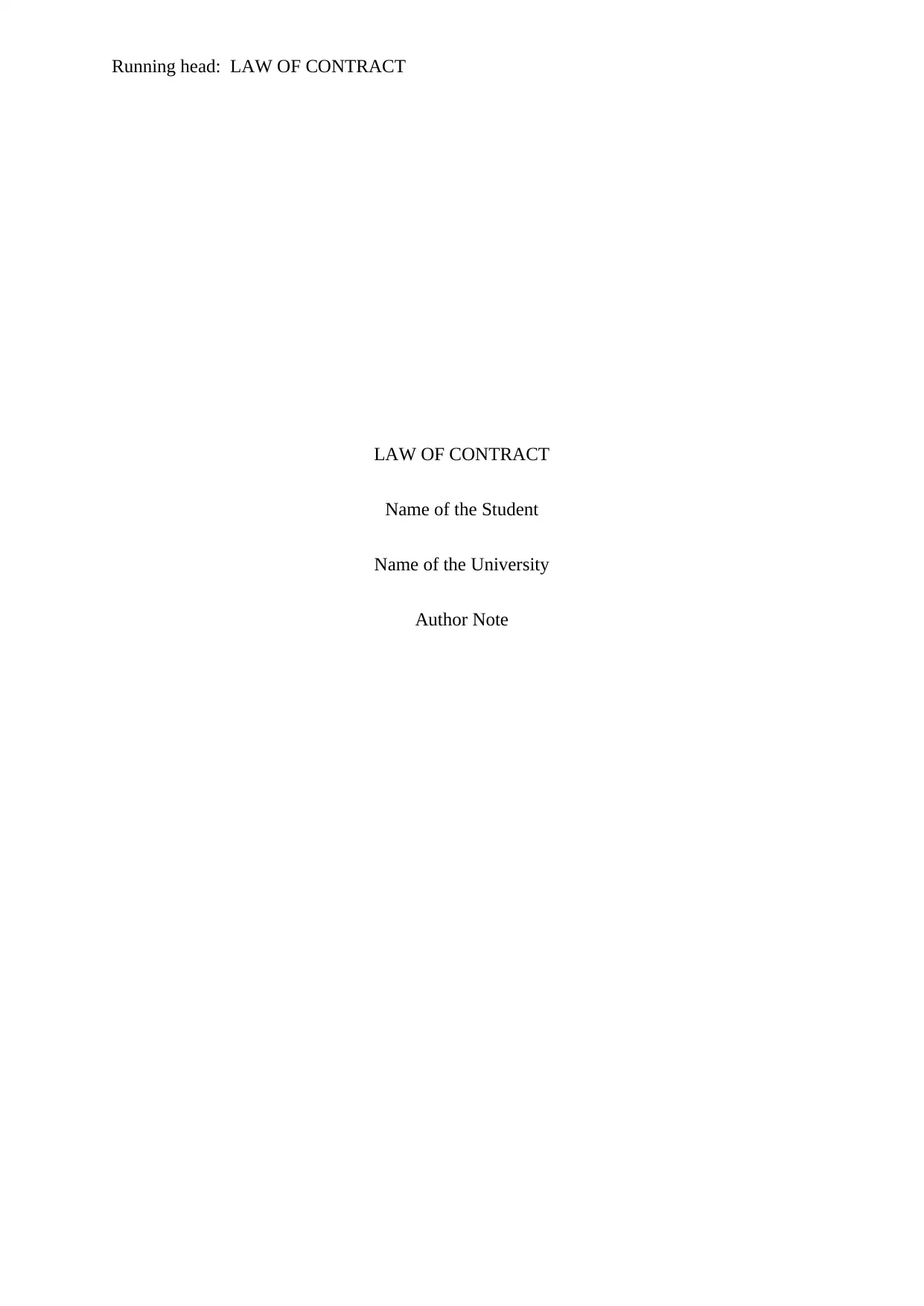
Running head: LAW OF CONTRACT
LAW OF CONTRACT
Name of the Student
Name of the University
Author Note
LAW OF CONTRACT
Name of the Student
Name of the University
Author Note
Paraphrase This Document
Need a fresh take? Get an instant paraphrase of this document with our AI Paraphraser

1LAW OF CONTRACT
Table of Contents
Question A.................................................................................................................................2
Question B..................................................................................................................................5
Table of Contents
Question A.................................................................................................................................2
Question B..................................................................................................................................5
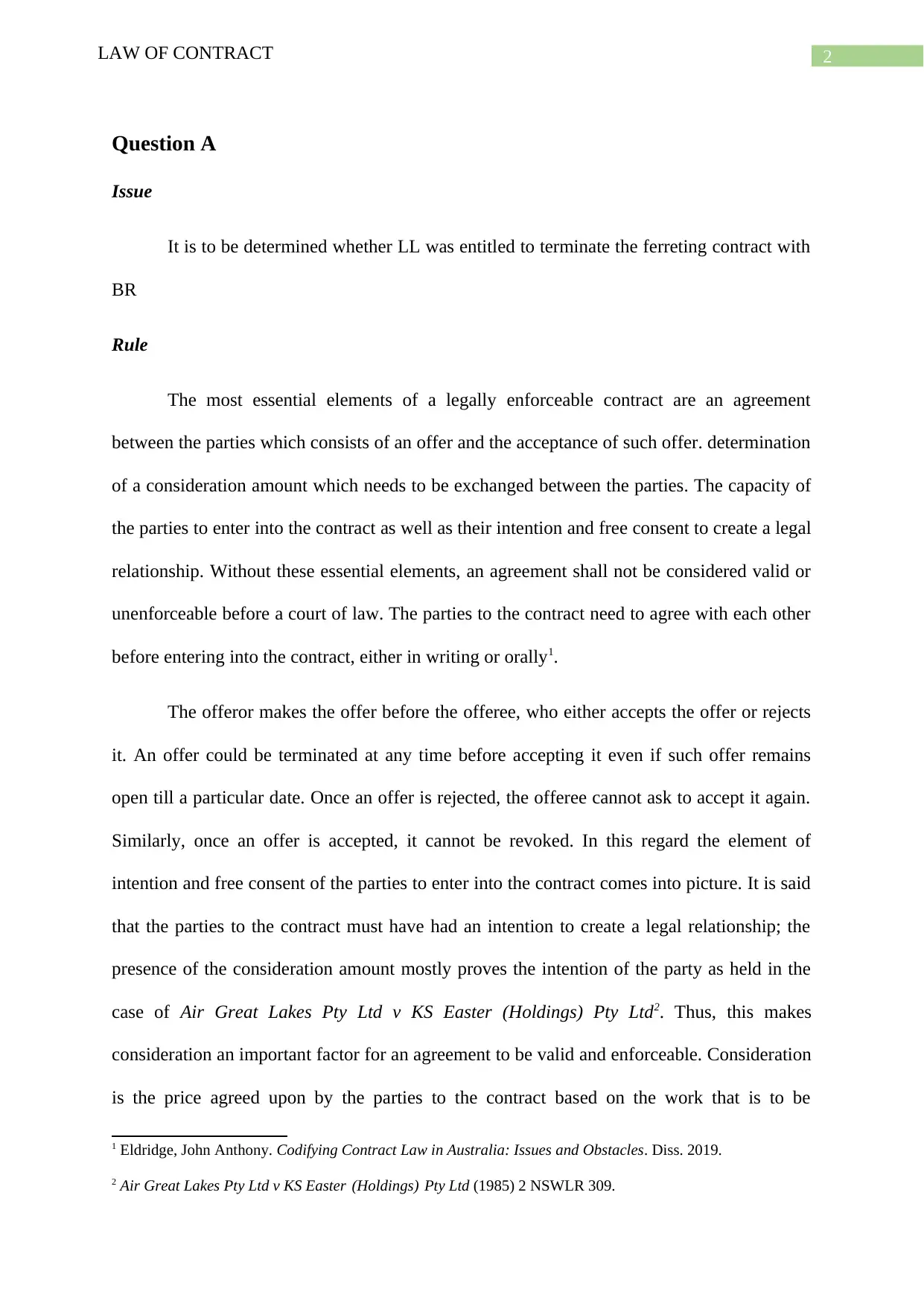
2LAW OF CONTRACT
Question A
Issue
It is to be determined whether LL was entitled to terminate the ferreting contract with
BR
Rule
The most essential elements of a legally enforceable contract are an agreement
between the parties which consists of an offer and the acceptance of such offer. determination
of a consideration amount which needs to be exchanged between the parties. The capacity of
the parties to enter into the contract as well as their intention and free consent to create a legal
relationship. Without these essential elements, an agreement shall not be considered valid or
unenforceable before a court of law. The parties to the contract need to agree with each other
before entering into the contract, either in writing or orally1.
The offeror makes the offer before the offeree, who either accepts the offer or rejects
it. An offer could be terminated at any time before accepting it even if such offer remains
open till a particular date. Once an offer is rejected, the offeree cannot ask to accept it again.
Similarly, once an offer is accepted, it cannot be revoked. In this regard the element of
intention and free consent of the parties to enter into the contract comes into picture. It is said
that the parties to the contract must have had an intention to create a legal relationship; the
presence of the consideration amount mostly proves the intention of the party as held in the
case of Air Great Lakes Pty Ltd v KS Easter (Holdings) Pty Ltd2. Thus, this makes
consideration an important factor for an agreement to be valid and enforceable. Consideration
is the price agreed upon by the parties to the contract based on the work that is to be
1 Eldridge, John Anthony. Codifying Contract Law in Australia: Issues and Obstacles. Diss. 2019.
2 Air Great Lakes Pty Ltd v KS Easter (Holdings) Pty Ltd (1985) 2 NSWLR 309.
Question A
Issue
It is to be determined whether LL was entitled to terminate the ferreting contract with
BR
Rule
The most essential elements of a legally enforceable contract are an agreement
between the parties which consists of an offer and the acceptance of such offer. determination
of a consideration amount which needs to be exchanged between the parties. The capacity of
the parties to enter into the contract as well as their intention and free consent to create a legal
relationship. Without these essential elements, an agreement shall not be considered valid or
unenforceable before a court of law. The parties to the contract need to agree with each other
before entering into the contract, either in writing or orally1.
The offeror makes the offer before the offeree, who either accepts the offer or rejects
it. An offer could be terminated at any time before accepting it even if such offer remains
open till a particular date. Once an offer is rejected, the offeree cannot ask to accept it again.
Similarly, once an offer is accepted, it cannot be revoked. In this regard the element of
intention and free consent of the parties to enter into the contract comes into picture. It is said
that the parties to the contract must have had an intention to create a legal relationship; the
presence of the consideration amount mostly proves the intention of the party as held in the
case of Air Great Lakes Pty Ltd v KS Easter (Holdings) Pty Ltd2. Thus, this makes
consideration an important factor for an agreement to be valid and enforceable. Consideration
is the price agreed upon by the parties to the contract based on the work that is to be
1 Eldridge, John Anthony. Codifying Contract Law in Australia: Issues and Obstacles. Diss. 2019.
2 Air Great Lakes Pty Ltd v KS Easter (Holdings) Pty Ltd (1985) 2 NSWLR 309.
⊘ This is a preview!⊘
Do you want full access?
Subscribe today to unlock all pages.

Trusted by 1+ million students worldwide
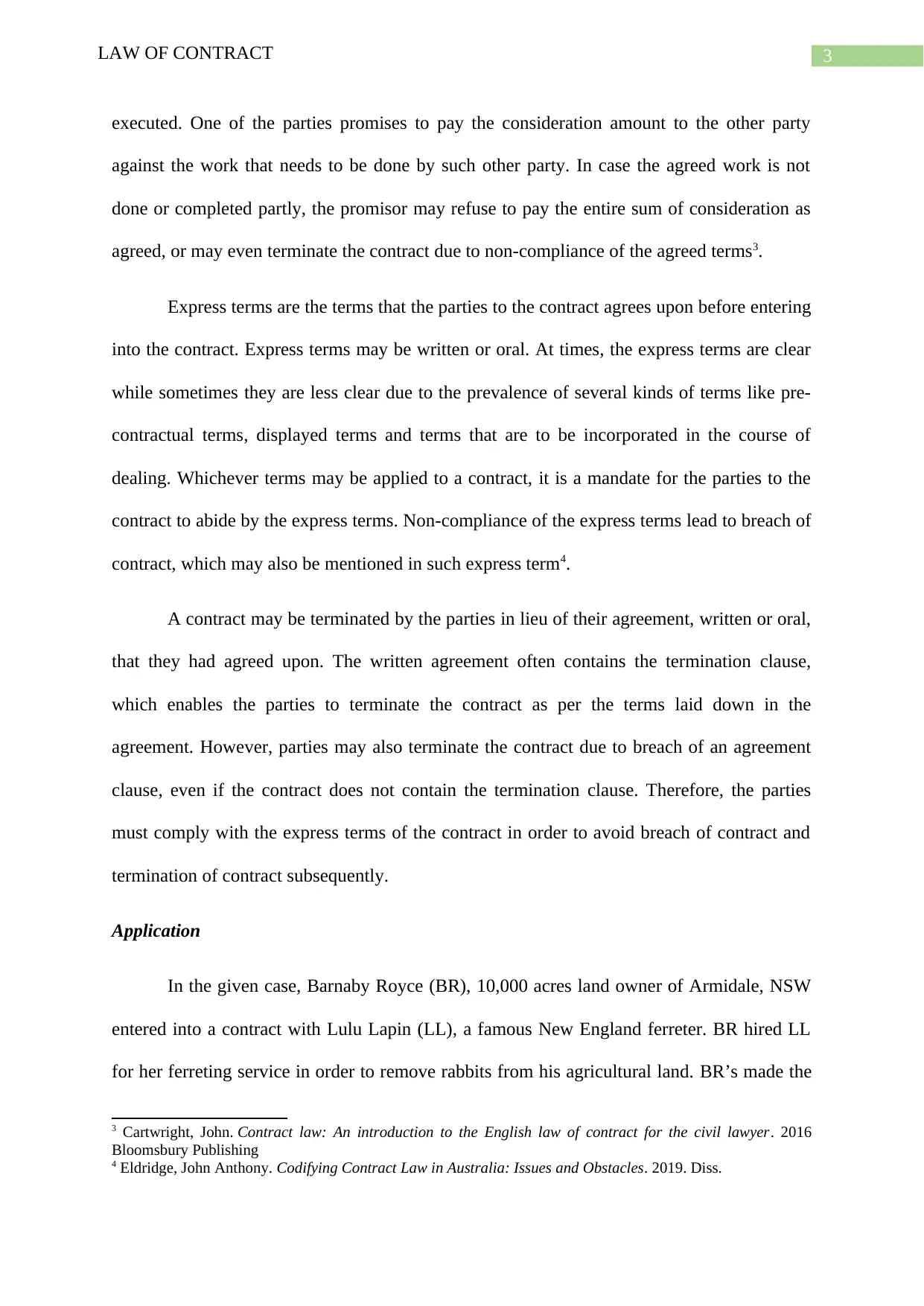
3LAW OF CONTRACT
executed. One of the parties promises to pay the consideration amount to the other party
against the work that needs to be done by such other party. In case the agreed work is not
done or completed partly, the promisor may refuse to pay the entire sum of consideration as
agreed, or may even terminate the contract due to non-compliance of the agreed terms3.
Express terms are the terms that the parties to the contract agrees upon before entering
into the contract. Express terms may be written or oral. At times, the express terms are clear
while sometimes they are less clear due to the prevalence of several kinds of terms like pre-
contractual terms, displayed terms and terms that are to be incorporated in the course of
dealing. Whichever terms may be applied to a contract, it is a mandate for the parties to the
contract to abide by the express terms. Non-compliance of the express terms lead to breach of
contract, which may also be mentioned in such express term4.
A contract may be terminated by the parties in lieu of their agreement, written or oral,
that they had agreed upon. The written agreement often contains the termination clause,
which enables the parties to terminate the contract as per the terms laid down in the
agreement. However, parties may also terminate the contract due to breach of an agreement
clause, even if the contract does not contain the termination clause. Therefore, the parties
must comply with the express terms of the contract in order to avoid breach of contract and
termination of contract subsequently.
Application
In the given case, Barnaby Royce (BR), 10,000 acres land owner of Armidale, NSW
entered into a contract with Lulu Lapin (LL), a famous New England ferreter. BR hired LL
for her ferreting service in order to remove rabbits from his agricultural land. BR’s made the
3 Cartwright, John. Contract law: An introduction to the English law of contract for the civil lawyer. 2016
Bloomsbury Publishing
4 Eldridge, John Anthony. Codifying Contract Law in Australia: Issues and Obstacles. 2019. Diss.
executed. One of the parties promises to pay the consideration amount to the other party
against the work that needs to be done by such other party. In case the agreed work is not
done or completed partly, the promisor may refuse to pay the entire sum of consideration as
agreed, or may even terminate the contract due to non-compliance of the agreed terms3.
Express terms are the terms that the parties to the contract agrees upon before entering
into the contract. Express terms may be written or oral. At times, the express terms are clear
while sometimes they are less clear due to the prevalence of several kinds of terms like pre-
contractual terms, displayed terms and terms that are to be incorporated in the course of
dealing. Whichever terms may be applied to a contract, it is a mandate for the parties to the
contract to abide by the express terms. Non-compliance of the express terms lead to breach of
contract, which may also be mentioned in such express term4.
A contract may be terminated by the parties in lieu of their agreement, written or oral,
that they had agreed upon. The written agreement often contains the termination clause,
which enables the parties to terminate the contract as per the terms laid down in the
agreement. However, parties may also terminate the contract due to breach of an agreement
clause, even if the contract does not contain the termination clause. Therefore, the parties
must comply with the express terms of the contract in order to avoid breach of contract and
termination of contract subsequently.
Application
In the given case, Barnaby Royce (BR), 10,000 acres land owner of Armidale, NSW
entered into a contract with Lulu Lapin (LL), a famous New England ferreter. BR hired LL
for her ferreting service in order to remove rabbits from his agricultural land. BR’s made the
3 Cartwright, John. Contract law: An introduction to the English law of contract for the civil lawyer. 2016
Bloomsbury Publishing
4 Eldridge, John Anthony. Codifying Contract Law in Australia: Issues and Obstacles. 2019. Diss.
Paraphrase This Document
Need a fresh take? Get an instant paraphrase of this document with our AI Paraphraser
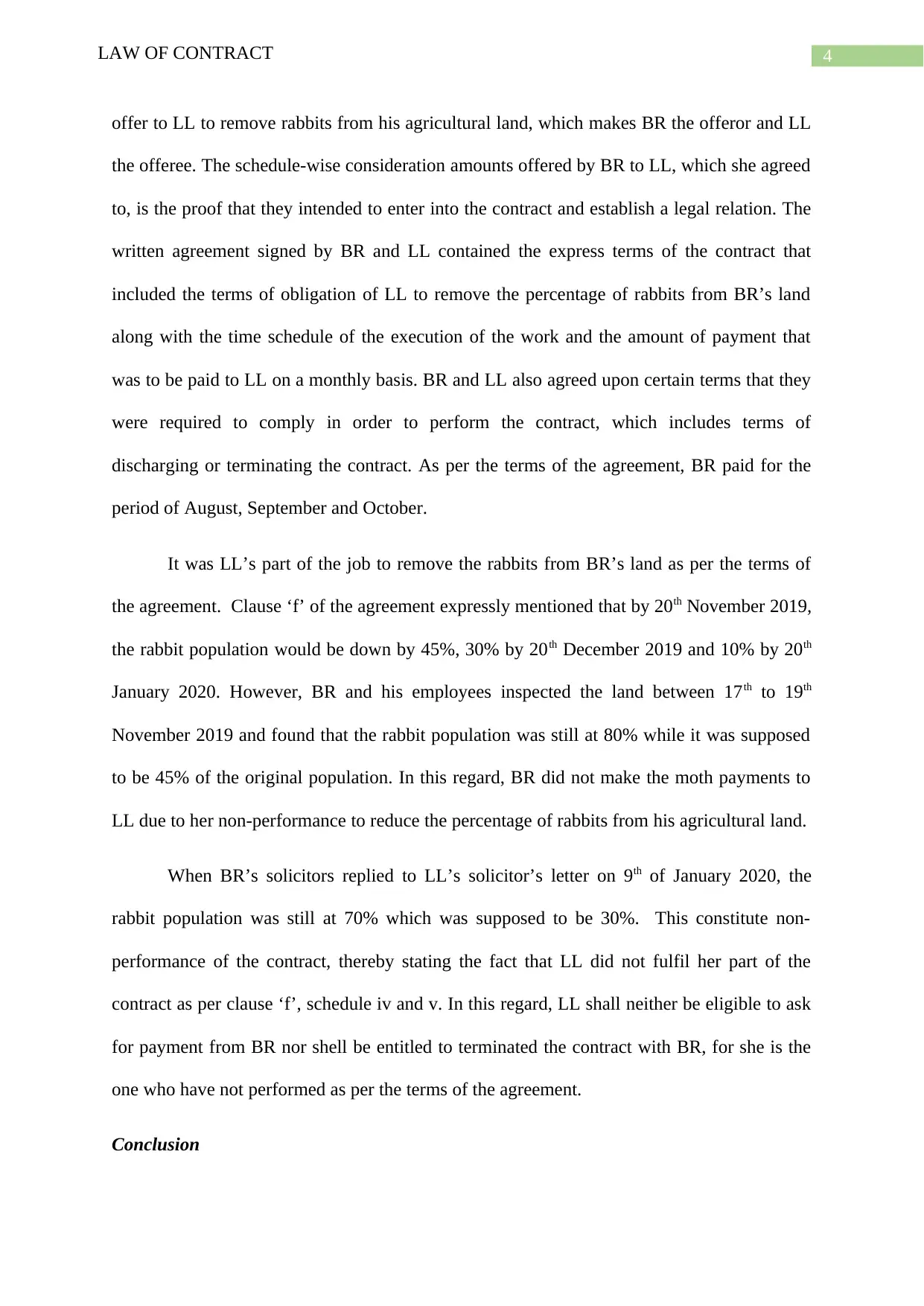
4LAW OF CONTRACT
offer to LL to remove rabbits from his agricultural land, which makes BR the offeror and LL
the offeree. The schedule-wise consideration amounts offered by BR to LL, which she agreed
to, is the proof that they intended to enter into the contract and establish a legal relation. The
written agreement signed by BR and LL contained the express terms of the contract that
included the terms of obligation of LL to remove the percentage of rabbits from BR’s land
along with the time schedule of the execution of the work and the amount of payment that
was to be paid to LL on a monthly basis. BR and LL also agreed upon certain terms that they
were required to comply in order to perform the contract, which includes terms of
discharging or terminating the contract. As per the terms of the agreement, BR paid for the
period of August, September and October.
It was LL’s part of the job to remove the rabbits from BR’s land as per the terms of
the agreement. Clause ‘f’ of the agreement expressly mentioned that by 20th November 2019,
the rabbit population would be down by 45%, 30% by 20th December 2019 and 10% by 20th
January 2020. However, BR and his employees inspected the land between 17th to 19th
November 2019 and found that the rabbit population was still at 80% while it was supposed
to be 45% of the original population. In this regard, BR did not make the moth payments to
LL due to her non-performance to reduce the percentage of rabbits from his agricultural land.
When BR’s solicitors replied to LL’s solicitor’s letter on 9th of January 2020, the
rabbit population was still at 70% which was supposed to be 30%. This constitute non-
performance of the contract, thereby stating the fact that LL did not fulfil her part of the
contract as per clause ‘f’, schedule iv and v. In this regard, LL shall neither be eligible to ask
for payment from BR nor shell be entitled to terminated the contract with BR, for she is the
one who have not performed as per the terms of the agreement.
Conclusion
offer to LL to remove rabbits from his agricultural land, which makes BR the offeror and LL
the offeree. The schedule-wise consideration amounts offered by BR to LL, which she agreed
to, is the proof that they intended to enter into the contract and establish a legal relation. The
written agreement signed by BR and LL contained the express terms of the contract that
included the terms of obligation of LL to remove the percentage of rabbits from BR’s land
along with the time schedule of the execution of the work and the amount of payment that
was to be paid to LL on a monthly basis. BR and LL also agreed upon certain terms that they
were required to comply in order to perform the contract, which includes terms of
discharging or terminating the contract. As per the terms of the agreement, BR paid for the
period of August, September and October.
It was LL’s part of the job to remove the rabbits from BR’s land as per the terms of
the agreement. Clause ‘f’ of the agreement expressly mentioned that by 20th November 2019,
the rabbit population would be down by 45%, 30% by 20th December 2019 and 10% by 20th
January 2020. However, BR and his employees inspected the land between 17th to 19th
November 2019 and found that the rabbit population was still at 80% while it was supposed
to be 45% of the original population. In this regard, BR did not make the moth payments to
LL due to her non-performance to reduce the percentage of rabbits from his agricultural land.
When BR’s solicitors replied to LL’s solicitor’s letter on 9th of January 2020, the
rabbit population was still at 70% which was supposed to be 30%. This constitute non-
performance of the contract, thereby stating the fact that LL did not fulfil her part of the
contract as per clause ‘f’, schedule iv and v. In this regard, LL shall neither be eligible to ask
for payment from BR nor shell be entitled to terminated the contract with BR, for she is the
one who have not performed as per the terms of the agreement.
Conclusion
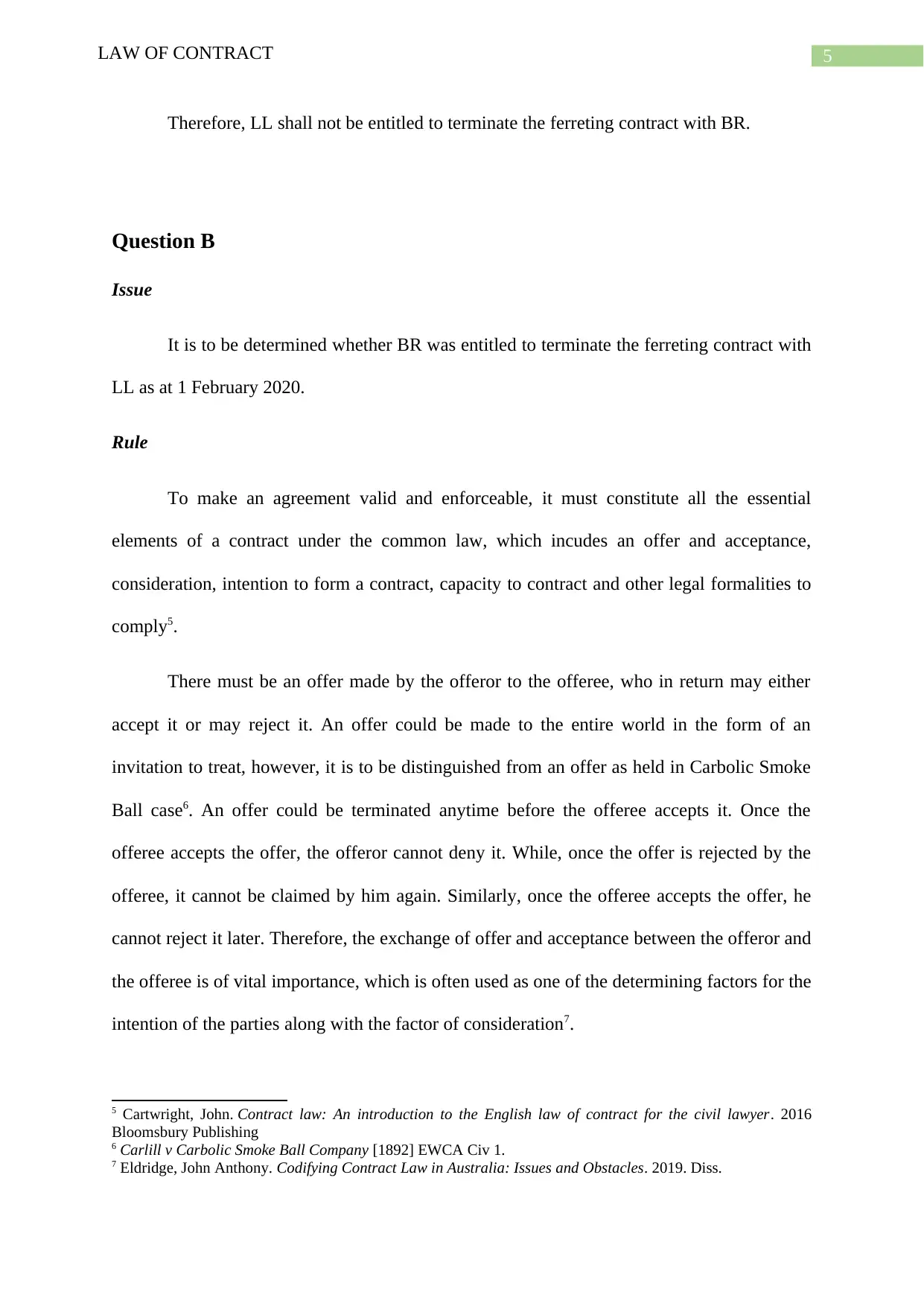
5LAW OF CONTRACT
Therefore, LL shall not be entitled to terminate the ferreting contract with BR.
Question B
Issue
It is to be determined whether BR was entitled to terminate the ferreting contract with
LL as at 1 February 2020.
Rule
To make an agreement valid and enforceable, it must constitute all the essential
elements of a contract under the common law, which incudes an offer and acceptance,
consideration, intention to form a contract, capacity to contract and other legal formalities to
comply5.
There must be an offer made by the offeror to the offeree, who in return may either
accept it or may reject it. An offer could be made to the entire world in the form of an
invitation to treat, however, it is to be distinguished from an offer as held in Carbolic Smoke
Ball case6. An offer could be terminated anytime before the offeree accepts it. Once the
offeree accepts the offer, the offeror cannot deny it. While, once the offer is rejected by the
offeree, it cannot be claimed by him again. Similarly, once the offeree accepts the offer, he
cannot reject it later. Therefore, the exchange of offer and acceptance between the offeror and
the offeree is of vital importance, which is often used as one of the determining factors for the
intention of the parties along with the factor of consideration7.
5 Cartwright, John. Contract law: An introduction to the English law of contract for the civil lawyer. 2016
Bloomsbury Publishing
6 Carlill v Carbolic Smoke Ball Company [1892] EWCA Civ 1.
7 Eldridge, John Anthony. Codifying Contract Law in Australia: Issues and Obstacles. 2019. Diss.
Therefore, LL shall not be entitled to terminate the ferreting contract with BR.
Question B
Issue
It is to be determined whether BR was entitled to terminate the ferreting contract with
LL as at 1 February 2020.
Rule
To make an agreement valid and enforceable, it must constitute all the essential
elements of a contract under the common law, which incudes an offer and acceptance,
consideration, intention to form a contract, capacity to contract and other legal formalities to
comply5.
There must be an offer made by the offeror to the offeree, who in return may either
accept it or may reject it. An offer could be made to the entire world in the form of an
invitation to treat, however, it is to be distinguished from an offer as held in Carbolic Smoke
Ball case6. An offer could be terminated anytime before the offeree accepts it. Once the
offeree accepts the offer, the offeror cannot deny it. While, once the offer is rejected by the
offeree, it cannot be claimed by him again. Similarly, once the offeree accepts the offer, he
cannot reject it later. Therefore, the exchange of offer and acceptance between the offeror and
the offeree is of vital importance, which is often used as one of the determining factors for the
intention of the parties along with the factor of consideration7.
5 Cartwright, John. Contract law: An introduction to the English law of contract for the civil lawyer. 2016
Bloomsbury Publishing
6 Carlill v Carbolic Smoke Ball Company [1892] EWCA Civ 1.
7 Eldridge, John Anthony. Codifying Contract Law in Australia: Issues and Obstacles. 2019. Diss.
⊘ This is a preview!⊘
Do you want full access?
Subscribe today to unlock all pages.

Trusted by 1+ million students worldwide
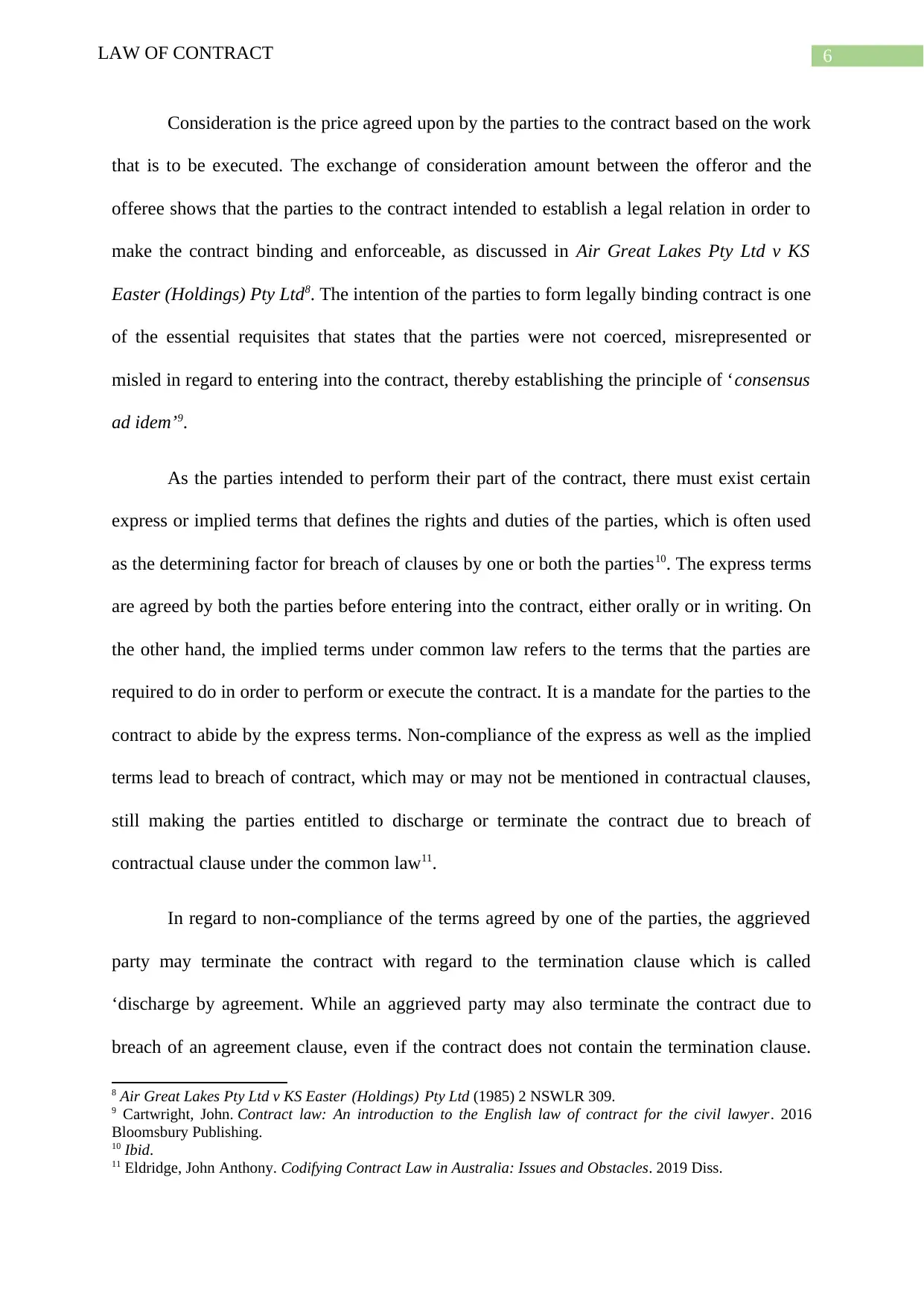
6LAW OF CONTRACT
Consideration is the price agreed upon by the parties to the contract based on the work
that is to be executed. The exchange of consideration amount between the offeror and the
offeree shows that the parties to the contract intended to establish a legal relation in order to
make the contract binding and enforceable, as discussed in Air Great Lakes Pty Ltd v KS
Easter (Holdings) Pty Ltd8. The intention of the parties to form legally binding contract is one
of the essential requisites that states that the parties were not coerced, misrepresented or
misled in regard to entering into the contract, thereby establishing the principle of ‘consensus
ad idem’9.
As the parties intended to perform their part of the contract, there must exist certain
express or implied terms that defines the rights and duties of the parties, which is often used
as the determining factor for breach of clauses by one or both the parties10. The express terms
are agreed by both the parties before entering into the contract, either orally or in writing. On
the other hand, the implied terms under common law refers to the terms that the parties are
required to do in order to perform or execute the contract. It is a mandate for the parties to the
contract to abide by the express terms. Non-compliance of the express as well as the implied
terms lead to breach of contract, which may or may not be mentioned in contractual clauses,
still making the parties entitled to discharge or terminate the contract due to breach of
contractual clause under the common law11.
In regard to non-compliance of the terms agreed by one of the parties, the aggrieved
party may terminate the contract with regard to the termination clause which is called
‘discharge by agreement. While an aggrieved party may also terminate the contract due to
breach of an agreement clause, even if the contract does not contain the termination clause.
8 Air Great Lakes Pty Ltd v KS Easter (Holdings) Pty Ltd (1985) 2 NSWLR 309.
9 Cartwright, John. Contract law: An introduction to the English law of contract for the civil lawyer. 2016
Bloomsbury Publishing.
10 Ibid.
11 Eldridge, John Anthony. Codifying Contract Law in Australia: Issues and Obstacles. 2019 Diss.
Consideration is the price agreed upon by the parties to the contract based on the work
that is to be executed. The exchange of consideration amount between the offeror and the
offeree shows that the parties to the contract intended to establish a legal relation in order to
make the contract binding and enforceable, as discussed in Air Great Lakes Pty Ltd v KS
Easter (Holdings) Pty Ltd8. The intention of the parties to form legally binding contract is one
of the essential requisites that states that the parties were not coerced, misrepresented or
misled in regard to entering into the contract, thereby establishing the principle of ‘consensus
ad idem’9.
As the parties intended to perform their part of the contract, there must exist certain
express or implied terms that defines the rights and duties of the parties, which is often used
as the determining factor for breach of clauses by one or both the parties10. The express terms
are agreed by both the parties before entering into the contract, either orally or in writing. On
the other hand, the implied terms under common law refers to the terms that the parties are
required to do in order to perform or execute the contract. It is a mandate for the parties to the
contract to abide by the express terms. Non-compliance of the express as well as the implied
terms lead to breach of contract, which may or may not be mentioned in contractual clauses,
still making the parties entitled to discharge or terminate the contract due to breach of
contractual clause under the common law11.
In regard to non-compliance of the terms agreed by one of the parties, the aggrieved
party may terminate the contract with regard to the termination clause which is called
‘discharge by agreement. While an aggrieved party may also terminate the contract due to
breach of an agreement clause, even if the contract does not contain the termination clause.
8 Air Great Lakes Pty Ltd v KS Easter (Holdings) Pty Ltd (1985) 2 NSWLR 309.
9 Cartwright, John. Contract law: An introduction to the English law of contract for the civil lawyer. 2016
Bloomsbury Publishing.
10 Ibid.
11 Eldridge, John Anthony. Codifying Contract Law in Australia: Issues and Obstacles. 2019 Diss.
Paraphrase This Document
Need a fresh take? Get an instant paraphrase of this document with our AI Paraphraser
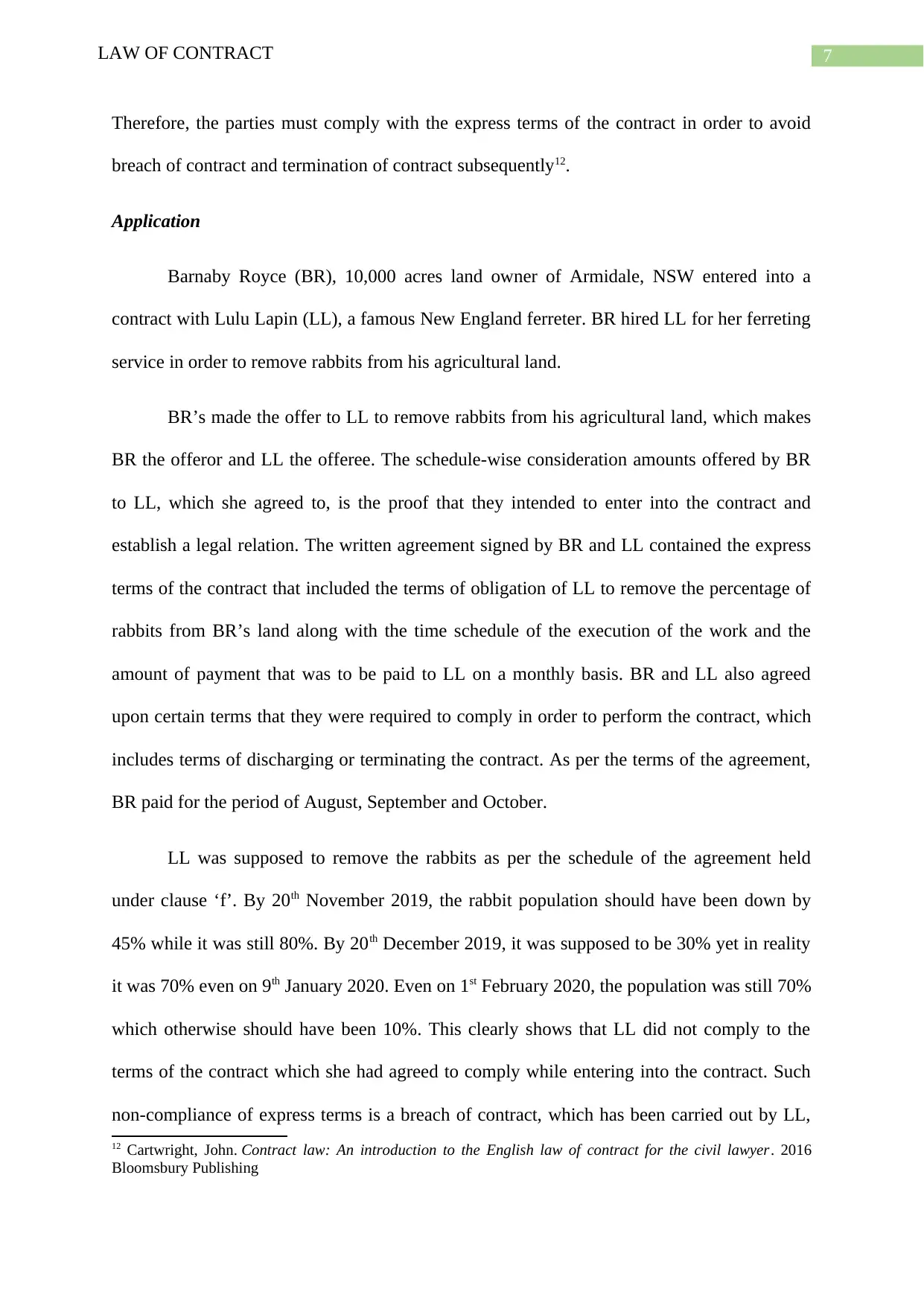
7LAW OF CONTRACT
Therefore, the parties must comply with the express terms of the contract in order to avoid
breach of contract and termination of contract subsequently12.
Application
Barnaby Royce (BR), 10,000 acres land owner of Armidale, NSW entered into a
contract with Lulu Lapin (LL), a famous New England ferreter. BR hired LL for her ferreting
service in order to remove rabbits from his agricultural land.
BR’s made the offer to LL to remove rabbits from his agricultural land, which makes
BR the offeror and LL the offeree. The schedule-wise consideration amounts offered by BR
to LL, which she agreed to, is the proof that they intended to enter into the contract and
establish a legal relation. The written agreement signed by BR and LL contained the express
terms of the contract that included the terms of obligation of LL to remove the percentage of
rabbits from BR’s land along with the time schedule of the execution of the work and the
amount of payment that was to be paid to LL on a monthly basis. BR and LL also agreed
upon certain terms that they were required to comply in order to perform the contract, which
includes terms of discharging or terminating the contract. As per the terms of the agreement,
BR paid for the period of August, September and October.
LL was supposed to remove the rabbits as per the schedule of the agreement held
under clause ‘f’. By 20th November 2019, the rabbit population should have been down by
45% while it was still 80%. By 20th December 2019, it was supposed to be 30% yet in reality
it was 70% even on 9th January 2020. Even on 1st February 2020, the population was still 70%
which otherwise should have been 10%. This clearly shows that LL did not comply to the
terms of the contract which she had agreed to comply while entering into the contract. Such
non-compliance of express terms is a breach of contract, which has been carried out by LL,
12 Cartwright, John. Contract law: An introduction to the English law of contract for the civil lawyer. 2016
Bloomsbury Publishing
Therefore, the parties must comply with the express terms of the contract in order to avoid
breach of contract and termination of contract subsequently12.
Application
Barnaby Royce (BR), 10,000 acres land owner of Armidale, NSW entered into a
contract with Lulu Lapin (LL), a famous New England ferreter. BR hired LL for her ferreting
service in order to remove rabbits from his agricultural land.
BR’s made the offer to LL to remove rabbits from his agricultural land, which makes
BR the offeror and LL the offeree. The schedule-wise consideration amounts offered by BR
to LL, which she agreed to, is the proof that they intended to enter into the contract and
establish a legal relation. The written agreement signed by BR and LL contained the express
terms of the contract that included the terms of obligation of LL to remove the percentage of
rabbits from BR’s land along with the time schedule of the execution of the work and the
amount of payment that was to be paid to LL on a monthly basis. BR and LL also agreed
upon certain terms that they were required to comply in order to perform the contract, which
includes terms of discharging or terminating the contract. As per the terms of the agreement,
BR paid for the period of August, September and October.
LL was supposed to remove the rabbits as per the schedule of the agreement held
under clause ‘f’. By 20th November 2019, the rabbit population should have been down by
45% while it was still 80%. By 20th December 2019, it was supposed to be 30% yet in reality
it was 70% even on 9th January 2020. Even on 1st February 2020, the population was still 70%
which otherwise should have been 10%. This clearly shows that LL did not comply to the
terms of the contract which she had agreed to comply while entering into the contract. Such
non-compliance of express terms is a breach of contract, which has been carried out by LL,
12 Cartwright, John. Contract law: An introduction to the English law of contract for the civil lawyer. 2016
Bloomsbury Publishing
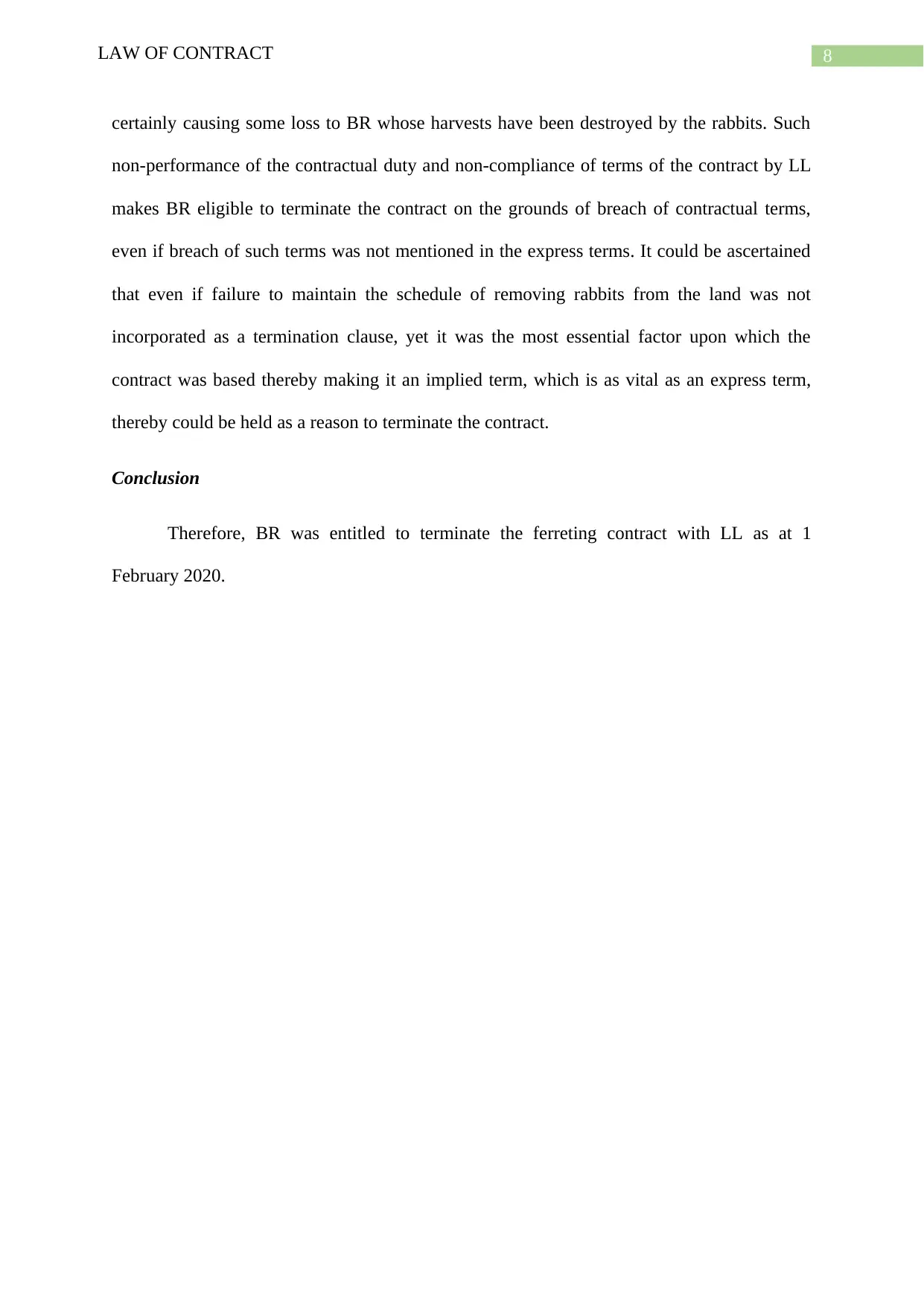
8LAW OF CONTRACT
certainly causing some loss to BR whose harvests have been destroyed by the rabbits. Such
non-performance of the contractual duty and non-compliance of terms of the contract by LL
makes BR eligible to terminate the contract on the grounds of breach of contractual terms,
even if breach of such terms was not mentioned in the express terms. It could be ascertained
that even if failure to maintain the schedule of removing rabbits from the land was not
incorporated as a termination clause, yet it was the most essential factor upon which the
contract was based thereby making it an implied term, which is as vital as an express term,
thereby could be held as a reason to terminate the contract.
Conclusion
Therefore, BR was entitled to terminate the ferreting contract with LL as at 1
February 2020.
certainly causing some loss to BR whose harvests have been destroyed by the rabbits. Such
non-performance of the contractual duty and non-compliance of terms of the contract by LL
makes BR eligible to terminate the contract on the grounds of breach of contractual terms,
even if breach of such terms was not mentioned in the express terms. It could be ascertained
that even if failure to maintain the schedule of removing rabbits from the land was not
incorporated as a termination clause, yet it was the most essential factor upon which the
contract was based thereby making it an implied term, which is as vital as an express term,
thereby could be held as a reason to terminate the contract.
Conclusion
Therefore, BR was entitled to terminate the ferreting contract with LL as at 1
February 2020.
⊘ This is a preview!⊘
Do you want full access?
Subscribe today to unlock all pages.

Trusted by 1+ million students worldwide
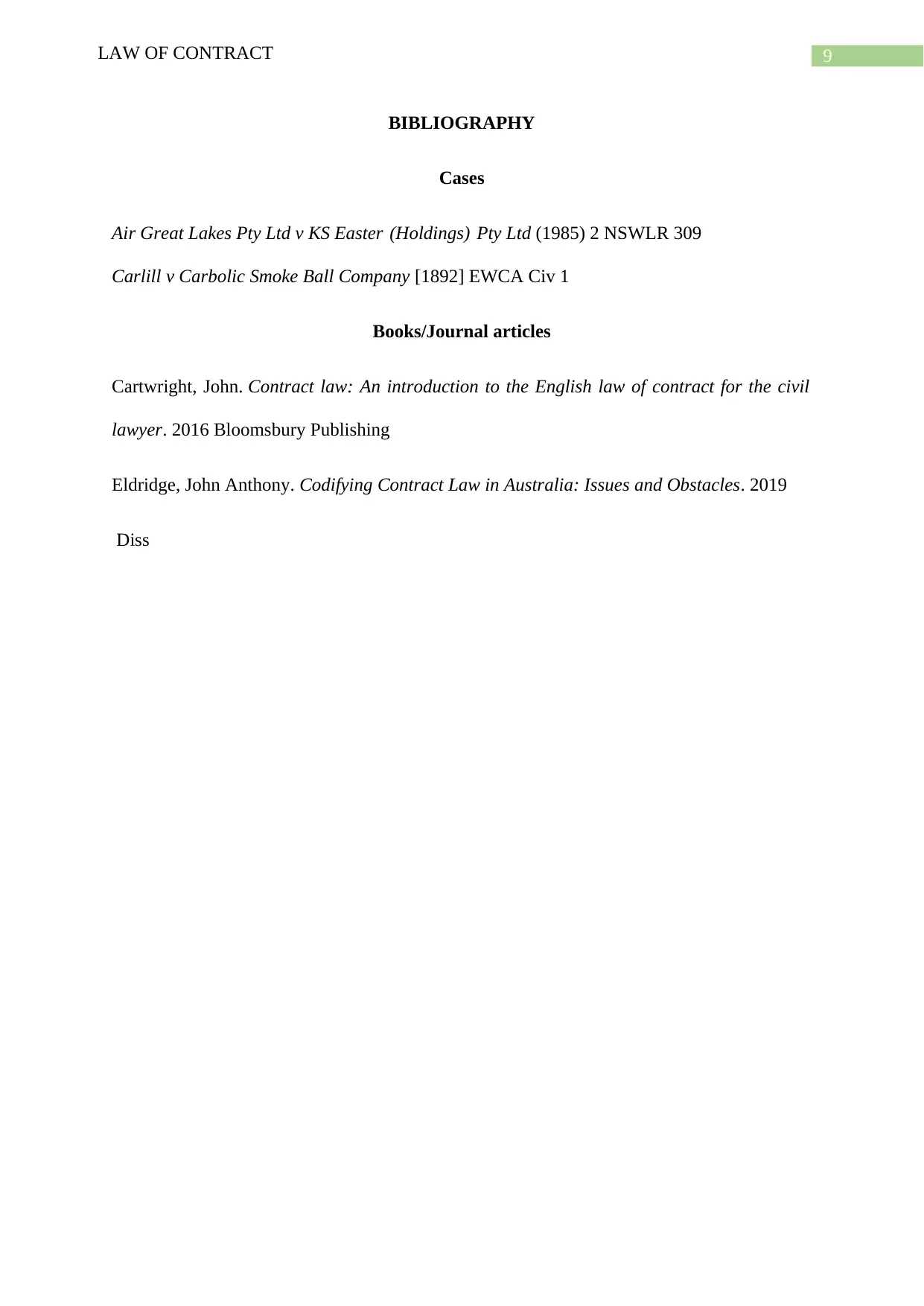
9LAW OF CONTRACT
BIBLIOGRAPHY
Cases
Air Great Lakes Pty Ltd v KS Easter (Holdings) Pty Ltd (1985) 2 NSWLR 309
Carlill v Carbolic Smoke Ball Company [1892] EWCA Civ 1
Books/Journal articles
Cartwright, John. Contract law: An introduction to the English law of contract for the civil
lawyer. 2016 Bloomsbury Publishing
Eldridge, John Anthony. Codifying Contract Law in Australia: Issues and Obstacles. 2019
Diss
BIBLIOGRAPHY
Cases
Air Great Lakes Pty Ltd v KS Easter (Holdings) Pty Ltd (1985) 2 NSWLR 309
Carlill v Carbolic Smoke Ball Company [1892] EWCA Civ 1
Books/Journal articles
Cartwright, John. Contract law: An introduction to the English law of contract for the civil
lawyer. 2016 Bloomsbury Publishing
Eldridge, John Anthony. Codifying Contract Law in Australia: Issues and Obstacles. 2019
Diss
1 out of 10
Related Documents
Your All-in-One AI-Powered Toolkit for Academic Success.
+13062052269
info@desklib.com
Available 24*7 on WhatsApp / Email
![[object Object]](/_next/static/media/star-bottom.7253800d.svg)
Unlock your academic potential
Copyright © 2020–2026 A2Z Services. All Rights Reserved. Developed and managed by ZUCOL.





